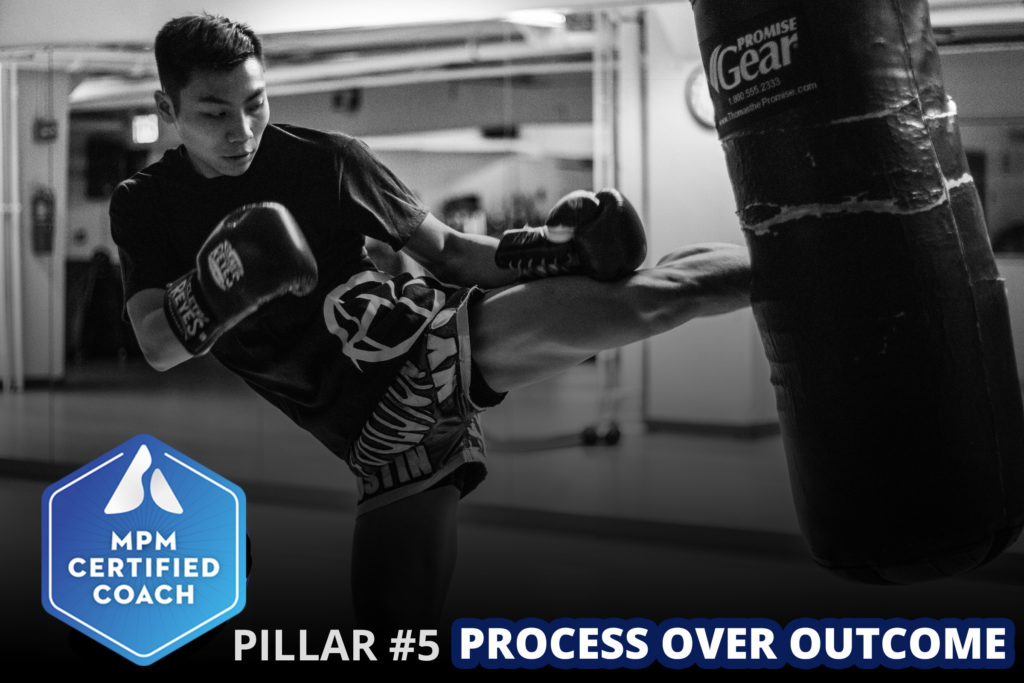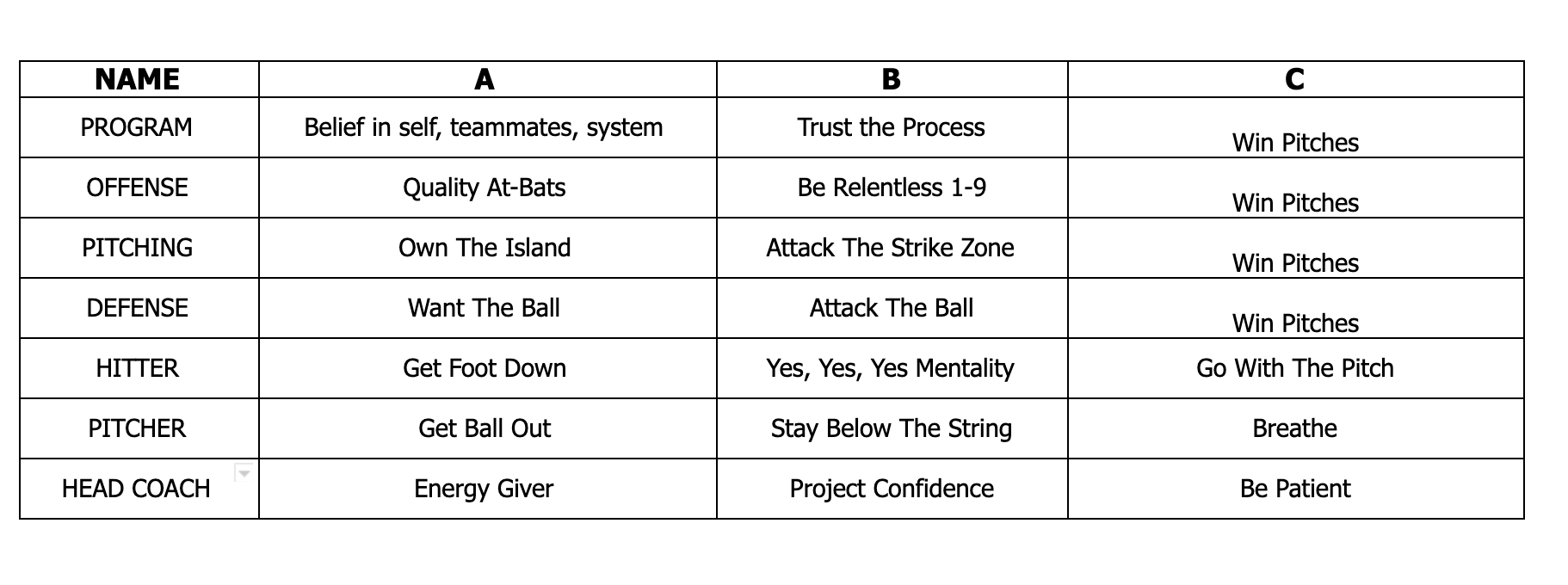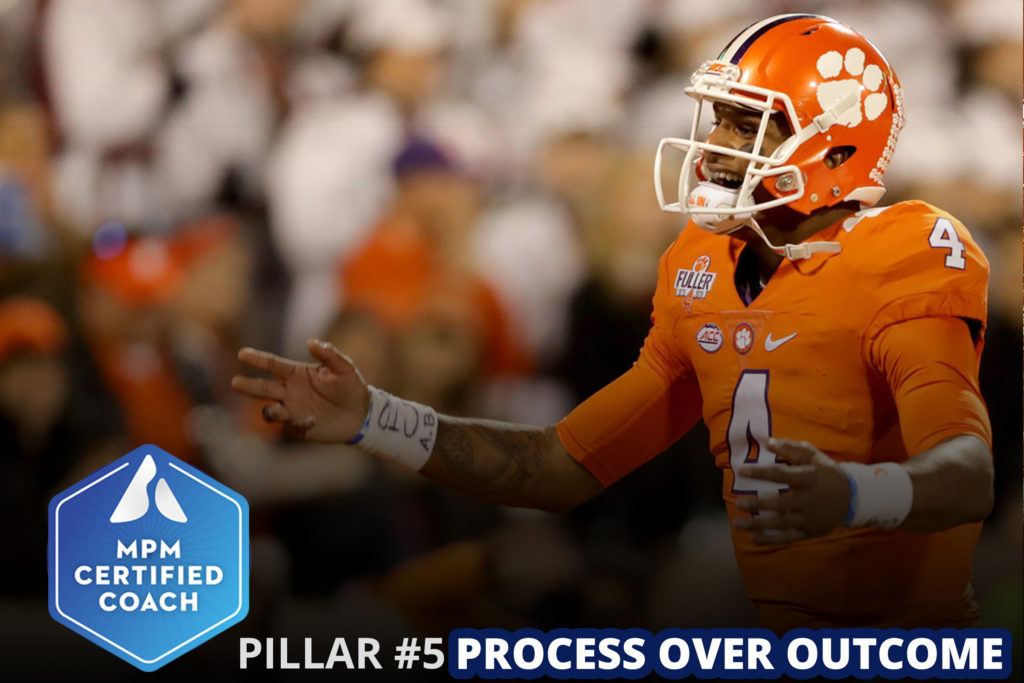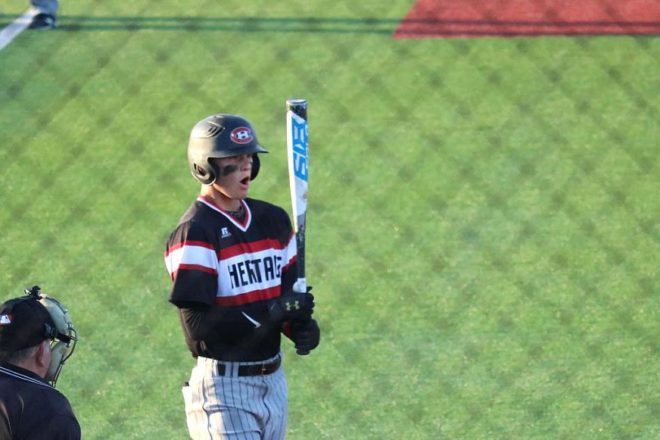
Get this FREE MiniCourse to help your athletes perform their best, overcome any obstacle, and stay focused under pressure.
“Becoming a champion is not an easy process… It is done by focusing on what it takes to get there and not on getting there”
Nick Saban, Head Football Coach, The University of Alabama
The society we live in is a results-driven society.
As a coach, your job is likely in jeopardy if you don’t win games—and lots of them. The kicker is that to win you must not focus on winning… but on the process of winning.
Coaches and athletes I work with must often unlearn what they have learned to focus on in their sport.
Mainly—winning and focusing on other outcomes that are outside of their control vs. processes that are within their control. Things that actually give them the best chance for success.
Mental performance mastery is about understanding that winning is the outcome of performance excellence—the product of an individual’s or team’s performance. The focus of the individual athlete and team, therefore, ought to be their performance. Because that’s what is truly within their control and yields the desired outcome.
More precisely, a performer’s focus should be on the process of his performance to provide the best opportunity for performance excellence.
For a lot of people, this line of thinking seems backward. We’re so used to just focusing on winning.
The best coaches and athletes in the world know the value of focusing on the process. They see the process as a staircase they climb each day.
They know what their desired outcome is and focus on that outcome 20% of the time while focusing on TODAY 80% of the time and the steps they must take to get the outcome they desire.
THE BEST TEAM NEVER WINS
I have had the wonderful privilege of getting to know and work with one of the all-time greatest UFC fighters, Georges St-Pierre.
Georges is one of the best athletes on the planet and a large part of his consistent success has been his ability to stay focused on the process of becoming the best fighter he can be (the journey) while letting go of his desired outcome to be and maintain the status of world champion (destination).
By focusing on the process of being the best he can be through constantly evolving as he aims for self-improvement and personal progress, Georges gives himself the best chance to retain his World Championship title.
Georges realized that even though he was one of the best fighters, if not THE best fighter, on the planet, he could get knocked off the summit of mixed martial arts on any given night. He learned the hard way that the best fighter never wins. It’s always the guy who fights the best.
The same logic can be applied to any form of competition. You may be the world champion or part of the best team in the world, but during a performance, it doesn’t matter who is more talented or who has a more impressive resume.
In the heat of competition, all that matters is who competes at a higher level—THAT day.
If you are the underdog, and your whole mentality revolves around you playing your game, regardless of the accolades and accomplishments of your opponent, then you have done what I call “released your mental emergency brake,” enabling you to play your game at the highest level.

CONTROL WHAT YOU CAN CONTROL
Mental performance mastery is about understanding the significance of the process over the outcome and establishing proficiency for recognizing what you CAN control—and what you cannot.
This is what “focusing on the process of winning” is all about! It’s amazing how easy it is to get hung up on things outside of your control. To become a peak performer, you must learn how to differentiate between what you can control and what you cannot control.
When you put time and energy into things you cannot control, you are wasting both of those valuable resources. Focusing on these things is a self-defeating game and assists the opposition in the process.
Those committed to mental performance mastery do not play that game.
Here’s a (short) list of things you cannot control in sports:
- The officials
- The fans
- The media
- The other team
- Playing time
- Field conditions
- Individual statistics (batting average, etc.)
And most of all: The outcome of an athletic contest.
We like to fool ourselves into thinking we have a lot more control than we do. But if you’re truly dedicated to helping athletes reach their full potential and perform at the highest level possible, you have to be willing to accept there are a lot of things you (and they) CAN’T control.
And then direct all of your focus toward what you CAN control—and teach everyone you coach to do the same.
Next, we’ll cover one extremely powerful strategy to help you do just that.
THE MILLION-DOLLAR QUESTION: WHAT CAN YOU CONTROL?
In any athletic contest, there only a select few things you can control: Your attitude and appearance (body language); your positive self-talk, presence (focus), process (preparation), effort (how hard you compete), perspective and emotions.
The goal? Direct all of your energy and focus toward controlling those things—and let the outcome take care of itself.
I like to do a quick visual exercise with the athletes I work with, so they can really see “can control” vs. “cannot control.”
Here’s what you can do: Give your athletes a blank piece of paper and a pencil. Have them draw a line down the middle of the sheet, separating into halves.
At the top of the left side, tell them to write “can control.” On the top of the right side, direct them to write “cannot control.”
Now have them list out all of the things they can and cannot control in each respective column.
Note: If you’re doing this with your entire team, you can write this up on a whiteboard and have athletes call out things to go in the “can control” and cannot control” sections, so you can write it up on the board for everyone to see.
Once you have a good list on each side, tell your athletes this:
“Look at the list of things you cannot control. If we choose to focus on these things, we will inevitably beat ourselves. We will waste precious amounts of time and energy on things we have no control over. And we will NOT perform our best when it matters most. We refuse to get hooked by all of these things we cannot control—and keep all of our focus on what we CAN control.”
This is a powerful exercise that can be incredibly eye-opening for your athletes. And that’s a great place to start.
But there’s one other strategy you can use to take things to the next level…
PROCESS OVER OUTCOME STRATEGY: PERFORMANCE ABCs
As a coach or athlete in pursuit of mental performance mastery, you must focus your attention on what is within your control. External adversity is part of life: You make the choice of how you react to it.
One of the most effective strategies to help you focus on what you can control, and to create an effective process to help you play in the present, is an exercise called Performance ABCs.
Performance ABCs are three keys that can be mental, physical, or a combination of the two, that athletes repeat to themselves, visualize, and think about before and during competition. These ABCs of performance create a greater focus on the process that needs to be followed in order for competitive success.
Here are some samples of Performance ABCs that I helped create with a top college baseball team. They used this strategy to help them defeat the #1 ranked team in the country in a two out of three-game series.

You can see that we set general Performance ABCs for the program, offense, defense and pitching as a team and individually as hitters pitchers and coaches. Setting Performance ABCs for both team units (parts of the team as a whole) and as individual helps give the team a common focus on the process during competition while also providing the individual with the freedom and flexibility to be an individual.
It benefits each athlete and coach to set individual ABCs as a way for them to better identify the individual processes they must follow to give themselves the best chance for success and for them to contribute towards the team or units ABCs.
I challenge you to create your own Performance ABCs with your team, and/or individual athletes, for your sport.
Choose categories that apply to your sport and determine an effective set of ABCs that reflect the performance demands of those categories.

In this photo above you see NFL and former Clemson University quarterback Deshaun Watson has A.B.C. written on the athletic tape located on his right wrist. Many athletes will physically write reminders on their body or tape to have a visual cue that they see in competition or performance that reminds them of the ABC’s they set before the game..
FINAL THOUGHTS
Commitment to the process of excellent performance will give you the best opportunity to achieve performance excellence.
In today’s article, you learned that when you devote yourself to the process, you focus on the aspects of performance within your control as opposed to the elements beyond it and this is exactly how you give yourself the best chance for success.
Winning is a by-product of executing the fundamentals and focusing on the process over the outcome. You cannot control the outcome of winning, you influence it. Focus on the process and the aspects of performance that you control and by executing on those controllable aspects of performance you put yourself in the best position to win, and the process will eventually reward you with success.
YOUR NEXT MOVE: IF YOU WANT TO TAKE YOUR COACHING TO THE NEXT LEVEL, YOU NEED TO MASTER THE MENTAL SIDE OF PERFORMANCE
Knowing the what, when, and how of coaching mental performance—and trying to fit all of the pieces together on your own—can be burdensome.
That’s why I created the Mental Performance Mastery (MPM) Certification. Inside the MPM Certification, I’ll teach everything you need to add this crucial skill set to your coaching toolbox.
You will learn how to help your athletes and clients overcome mental barriers that trip them up and build the habits, mindset, and behaviors they need to be at their best when it matters most.
Not only will you develop a deep knowledge of the ten most valuable mental skills needed for peak mental performance, but you’ll also have a proven method for consistently and predictably developing these skills in those you coach.
The MPM Certification will open to new students for a limited time only twice a year (May and November). Join the free Insider’s List below to save $200 on the certification and be the first to know when it goes live.

